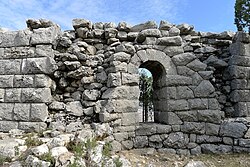Oenoanda
Oenoanda[a] (/iːnoʊˈændə/; Ancient Greek: Οἰνόανδα Oinoanda) was a Lycian city, in the upper valley of the River Xanthus.[1] The early history of the settlement is obscure, in spite of an exploratory survey carried out, with permission of the Turkish authorities, by the British Institute at Ankara (BIAA) in 1974–76.Diogenes, a rich and influential citizen of Oenoanda, had a summary of the philosophy of Epicurus carved onto a portico wall of the stoa showing the inhabitants the road to happiness.[15] By 2012 over 300 fragments of Diogenes' stoa had been identified, varying in size from a few letters to passages of several sentences covering more than one block.[16] Remains of a screw wine press were also discovered in a house which could prove that the activity suggested in the place name continued to be practised into the late history of the city.


HittiteMuğla ProvinceTurkeyDiogenescuneiform scriptAncient GreekLycianRiver XanthusEpicureanDiogenes of OenoandaFethiyeviticultureHittitesBronze Ageclassical antiquityTermessosKibyranHellenistic PeriodBalburaL. Licinius MurenaLycian LeagueEpicurusporticophysicsepistemologyethicsepigraphicHadrianictitular seeRoman Catholic ChurchRichard HoskynEdward ForbessiphonBridge at OinoandaDeutsches Archäologisches InstitutLucius Septimius Flavianus FlavillianusWayback MachineStraboSmith, Martin FergusonÖsterreichische Akademie der WissenschaftenXanthosPataraPinaraOlymposAperlaeSimenaIsindaApolloniaAmelasAntiphellusArycandaCyaneaeIdebessosLimyraPhaselisPhellusPodaliaRhodiapolisSidymaTelmessusTrebennaLetoonAncient settlements in TurkeyAegeanAbbassusAbrostolaAchaion LimenAcharacaAcmoniaAcrassusAdramyttiumAgatheiraAizanoiAlabandaAlindaAllianoiAlmuraAmnistaAmoriumAmynandaAmyzonAninetaAnnaeaAntandrusAntioch on the MaeanderApamea in PhrygiaAphrodisiasApollonia in MysiaApollonia SalbacesApollonisApollonos HieronAppolenaAragokomeAraukomeArcadiopolisArillaAspaneusAstragonAstyra near AdramyttiumAstyra near PergamonAstyriaAtarneusAtarneus sub PitanemAttudaAugustopolisAurelia NeapolisAureliopolis in LydiaAurokraBageisBargasaBargasa in northern CariaBargyliaBeudosBeycesultanBirgenaBlaundusBonitaiBoukolionBoutheiaBriulaBruzusBybassusCallipolisCareneCarmylessusCarura